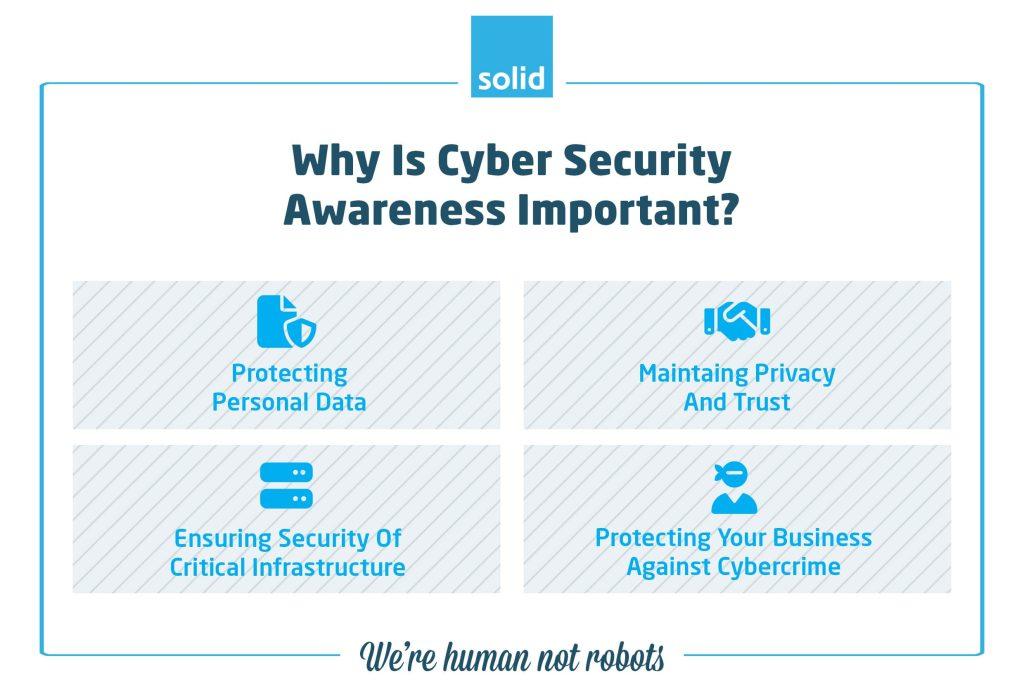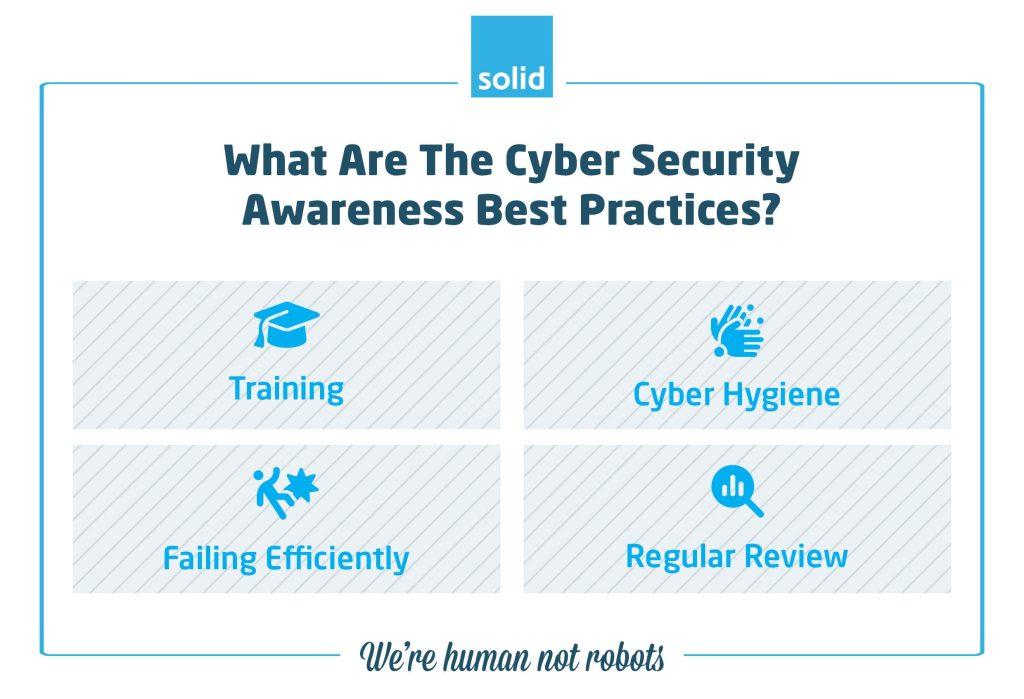
When threats to your business are constantly shifting and changing, keeping on top of them and knowing how to protect yourself from attack can be exceptionally challenging. This is why cyber security awareness has become a priority for companies around the world – so much so that the US even has a dedicated cybersecurity awareness month! That may fall in October, but it doesn’t mean that October is the only month when you should take cyber security awareness seriously – it is an endeavour that you should aim for throughout the year, whether your business is situated in the States, South Africa, the UK or elsewhere.
What Is Cyber Security Awareness?
Cyber security awareness is all about making sure that every human within your business, from your CEO, to your management team, to your marketing, finance, IT, sales, and every other team within your company, understands the threats that your business faces, knows their role in preventing attacks, and is aware of what they need to do if one occurs.
As you can imagine, with so many different stakeholders being involved, training your teams on the threats and vulnerabilities that face your business, and how to combat them, is critical to successful cyber safety awareness.
Why Is Cyber Security Awareness Important?

You can do everything in your power to protect your business. But if the only people who understand what cyber threats are out there are your IT team, then all of your efforts will be in vain. Because your users – your humans, those who manage the day-to-day running of your business – are targets for cyber attackers. And if they are unaware of the risks they pose, your company will fall victim to an attack before too long, if you haven’t already.
Here are just a few critical areas that situational awareness in cyber security can help with:
• Protecting Personal Data
Protecting the personal information that you process is essential for any business. Not only do you want to keep data secure in general within your company, but there are strict regulations in South Africa and the EU that govern how personal data can be stored and processed, and any data leak that compromises personally identifiable information is subject to harsh penalties under the POPI Act or GDPR. Focusing on cyber security awareness can at least ensure that such a breach won’t be caused by human error.
• Maintaining Privacy And Trust
It’s not just the GDPR and POPI Act that pose a threat when it comes to data leaks. Your clients place their trust in your business, and want to know that their data – personally identifiable or not – is in safe hands. Educating employees on cyber security can help your teams to understand the ways in which they can protect the privacy of confidential business information, and client data and details, alike.
• Ensuring Security Of Critical Infrastructure
Keeping day-to-day operations running smoothly is critical to business success. Anything that threatens to slow down your operations or see them grinding to a halt needs to be dealt with as a priority, and cyber security awareness can help your teams to recognise those threats as soon as possible, and respond to them in the right way, ensuring that infrastructure and data that is critical to your business operations stays up and running as much as possible. This is why conducting training on cyber security for employees should form part of any effective Data Recovery Plan.
• Protecting Your Business Against Cybercrime
The better your teams’ cyber threat awareness, the better prepared they will be to tackle cybercrime head on and avoid falling victim to attempted attacks. Knowing that there are steps that they can take to protect your business will also help them to practice better cyber hygiene in general, protecting themselves and your company in turn.
What Are The Cyber Security Awareness Best Practices?

When it comes to the best practices for ensuring that your teams have optimal cyber security awareness, it’s all about prioritising knowledge sharing, and ensuring consistent updates to make sure that your teams and your business don’t fall behind times.
• Training
There are two types of training when it comes to cyber security awareness for employees, and each is critical to your business protection. The first is the training that you arrange for your humans through cyber security sessions run by your IT team and through learning from one another’s experience, which we like to call whisper guidance.
The second form of training is the kind that your humans undergo on their own – keeping up to date with the latest cyber security dos and don’ts, trends and advice by following IT news through, for example, newsletters, online articles, and the right social media channels.
• Cyber Hygiene
Cyber hygiene is all about the small steps that you can regularly take to keep your business and your users protected, and the steps your humans can take for their own safety and that of your company. Practicing excellent cyber hygiene can also highlight the important of insider threat cyber awareness, ensuring that your teams understand the importance of their actions in preventing common types of cyber attacks by minimising human error. If you’re looking for a bit of guidance in maintaining optimum cyber hygiene, we’ve put together a personal checklist and a business checklist for you to download over on our resources page.
• Failing Efficiently
Because of the importance of cyber security awareness for your business, it can be easy to fall into the habit of punishing lapses or mistakes when they happen. But it’s important to remember that your teams are human, and errors are bound to happen. Rather than punishing them harshly, we’d recommend taking a stance of never making the same mistake twice, or failing efficiently as we like to say. Allow your teams the leeway to learn from their mistakes, and you’ll find them becoming more dedicated to protecting your business.
• Regular Review
Cyber security threats never stand still. Just as you learn how to protect yourself effectively from one threat, a new and different technique of attack will emerge, more sophisticated than before. This is why your cyber security awareness efforts should regularly be reviewed, ensuring that your training takes the latest threats into account and security stances are updated to reflect the latest threats and vulnerabilities.
What Are The Risks Of Neglecting Cyber Security Awareness?

Ignoring cyber security awareness is a risk that no business can afford. Leaving cyber awareness unaddressed will see your teams unprepared to face the wide range of cyber security threats that exist, and leaves your company exposed to risks like:
• Emails From Strangers
Phishing emails come in so many different shapes. Sometimes they’re clearly dodgy and easy to identify. But what happens when attackers impersonate people that your humans may know? Emails from strangers don’t always seem to come from unknown sources, and will your team be able to recognise them and know how to handle them without cyber security awareness training?
• Unprotected Login Credentials
Password best practices change so often that keeping login credentials protected from attack is one of the most difficult cyber security challenges even when you’re prioritising cyber security awareness. But when you aren’t, it becomes so much more dangerous for your data – personal, confidential, and otherwise – especially if your company isn’t putting Multi-Factor Authentication or Identity and Access Management protocols in place.
• Disruption Of Services
One of the biggest risks of not training your teams to ensure cyber security awareness, is that you’re making it far less likely that they’ll be able to recognise an attack, or know what to do when one occurs. The inevitable result is that when a disaster does strike your operations are going to grind to a halt as your team members run around like headless chickens having no idea what they should be doing or, worse, what they should be telling your clients.
• Damage To Your Reputation
Whether it’s a phishing mail that’s caught one of your humans unaware, a mailbox that gets compromised thanks to easy-to-guess login details, or an attack that brings your operations to a stop, one of the biggest results you can expect is a huge hit to your reputation. If you can’t protect your own company, how are your clients supposed to trust you with their data, money, and business?
• Financial Losses
Financial hits from poor cyber security awareness can take a few different forms. There are the operational losses when your business isn’t able to run effectively. There are the unexpected fees for recovering backups or investing in last-minute security solutions. There are fines and penalties if personal data becomes compromised. There’s the risk of having to pay an attacker to retrieve your data if you fall victim to a ransomware attack. And then there’s the lasting effect of lost business when your reputation takes a hit.
What Are The Challenges In Cyber Security Awareness Training?
Wouldn’t it just be easier to put a cyber security awareness plan in place than to deal with the negative outcomes of an attack? Absolutely. But that doesn’t mean that the process of embracing cyber security awareness is without its challenges.
• Constantly Changing Threats And Best Practices
Because best practices are constantly evolving to handle more sophisticated attacks, you can’t just put a cyber security awareness programme in place and leave that as that. You have to be prepared to adapt it regularly to keep it relevant.
• Time Consuming To Conduct And Organise
Setting aside the time for organising training takes you away from the critical tasks that you should be accomplishing in your regular role. And the time spent getting trained can have a significant impact on productivity for your teams. Which is why cyber security awareness training is often difficult to conduct without the help of an external party.
• Changing Staff And Lack Of Interest
You’ve spent so much time training your team members, only for them to leave your business. And then you have to start the process all over again, leading to those who have stayed hearing the same tips and advice over and over. The result can be a lack of interest and a feeling that their efforts are having little effect or aren’t being recognised.
How Can Solid Systems Help?
Over the past two decades, Solid Systems has helped companies in South Africa and around the world to protect themselves from evolving threats. Our human approach to IT services and IT support means that we want to see you succeeding and making security a priority within your business.
This is why we offer a wide range of cyber security services, from implementing world class technologies that can keep your business safe, to the onboarding of new users and training in the systems that you have in place, to helping you train your teams in the latest cyber security trends and best practices through a detailed cyber security awareness strategy.
You need an IT partner by your side who understands the challenges that you face when it comes to cyber security awareness. Get in touch with Solid Systems today to get a real sense of the impact that human IT can make on your business and your security.
Frequently Asked Questions (FAQs)
Cyber security awareness is all about making sure that every human within your business knows their role in preventing attacks, and is aware of what they need to do if one occurs. With so many different stakeholders being involved, training your teams on the threats and vulnerabilities that face your business, and how to combat them, is critical to success. It can help you to:
- Protect personal data
- Maintain privacy and trust
- Ensure security of critical infrastructure
- Protect yourself against cybercrime
Cyber security awareness training is essential for making sure that your teams understand the threats that your business faces and are well prepared to recognise and address them. This is why the best practices when it comes to cyber security awareness involve:
- Training
- Cyber hygiene
- Failing efficiently
- Regular review





